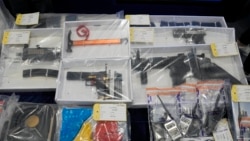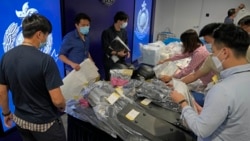Hong Kong police on Tuesday arrested nine people -- including six students – on suspicion of planning bomb attacks in the territory.
The individuals were detained on suspicion of taking part in terrorist activity under a national security law passed last year by the government in Beijing. At a press conference, police said six young people were among those arrested.
The group is accused of planning to set off homemade bombs at court buildings, tunnels and waste containers in the city. Police said evidence showed that the suspects were seeking “to maximize damage caused to society.”
Police said those arrested were attempting to make an explosive known as TATP, which has been widely used in bombings in Europe and other places.
The group is accused of trying to produce the explosive in a room at a low-cost hotel in Hong Kong. Police said they found and seized a “trace amount” of the explosive, as well as equipment used to make it. Police also froze about $77,000 in assets they said may be linked to the group.
If the accusations are true, the group appears to represent an extreme wing of Hong Kong’s pro-democracy movement.
China in recent years has moved to restrict freedoms in Hong Kong. Such moves led to large protests in the former British territory in 2019. Police in Hong Kong have used the national security law to arrest several leaders of the pro-democracy movement as well as some media officials.
Critics of the law say it seeks to silence dissent and crush freedoms promised to Hong Kong when it was passed to mainland China in 1997. Rights of the territory’s citizens were to be guaranteed under its Basic Law for 50 years.
Supporters of the national security law say it has brought stability to Hong Kong.
During her weekly news briefing Tuesday, Hong Kong chief executive Carrie Lam warned that “ideologies” present risks to national security in Hong Kong. She appealed to the public to “openly condemn threats of violence.”
Lam also urged parents, teachers and religious leaders to observe the behavior of teenagers and to report those suspected of breaking the law. “They should not be wrongly influenced by the idea that ... breaking the law is in order, if you’re trying to achieve a certain cause,” she said.
Lam also warned that government departments should not permit “illegal ideas to filter through to the public through education, broadcasting, arts and culture.”
Also Tuesday, Lam also said that an envelope of “white powder” had been sent to her office. Police said the substance was still being examined but that they did not believe it was dangerous.
I’m Bryan Lynn.
The Associated Press and Reuters reported on this story. Bryan Lynn adapted the reports for VOA Learning English. Ashley Thompson was the editor.
We want to hear from you. Write to us in the Comments section, and visit our Facebook page.
________________________________________________________
Words in This Story
tunnel – n. a passage constructed underground
maximize – v. to increase something as much as you can
trace – n. a very small amount of something
asset – n. something a person or company owns that has value
stability – n. the quality of not being likely to change or move
achieve – v. to succeed in doing something
filter – v. to permit some things through but not others
envelope – n. a flat paper container used to hold a letter







